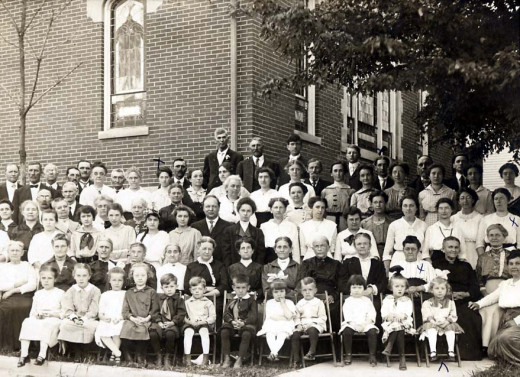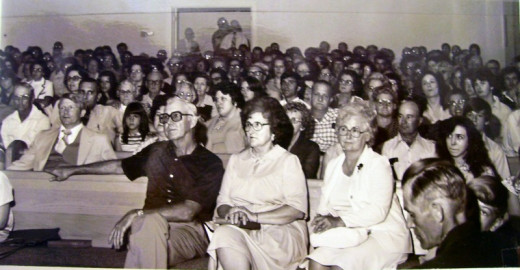The New Testament Church - What is it? - Part 1

The Gates of Hell Shall Not Prevail
" He saith unto them, But whom say ye that I am? And Simon Peter answered and said, Thou art the Christ, the Son of the living God. And Jesus answered and said unto him, Blessed art thou, Simon Barjona: for flesh and blood hath not revealed it unto thee, but my Father which is in heaven. And I say also unto thee, That thou art Peter, and upon this rock I will build my church; and the gates of hell shall not prevail against it." - Matthew 16:15-18
In these verses Jesus promises to build His church, But what exactly did He have in mind? Before moving on Let's glean a couple thoughts from these verses.
- Peter confessed Jesus Christ to be the very Son of God
- Christ would build His church upon that rock (the fact that He was the Son of God sent to be the Saviour).
- The gates of hell would not prevail against the church
- The church would be yet future (". . .I will build. . .")
Jesus Himself initiated the church. Jesus Himself died for His church. Jesus holds the church close to His broken heart. So what exactly is the church? The Apostle Paul gives us a hint. The New Testament church is a living organism. Its head is Christ, and Christ alone. Colossians 1:18 tells us, "And he [Christ] is the head of the body, the church; . . ." Paul continues in Ephesians 1:22 and 23, "And hath put all things under his feet, and gave him to be the head over all things to the church, Which is his body, the fulness of him that filleth all in all."
References to "church" in the NT
101 times
| 1 time
| 4 times
| 11 times
|
|---|---|---|---|
refers to a particular congregation
| refers to Israel (Acts 7:38)
| the temples at Ephesus
| institutional, abstract, generic
|
The Body of Christ
The term, church is found 117 times in the New Testament..The Bible makes it very clear that the church is the body of Christ. The church (ἐκκλησία - ekklesia), by definition refers to a called out assembly either in a general manner or in a local setting. Contrary to popular belief, the Bible never refers to the church as invisible or universal. We owe these terms to erroneous Roman Catholic teaching.
The word church or churches appears:
- 25 times in the book of Acts
- 5 times in the book of Romans
- 21 times in I Corinthians
- 9 times in II Corinthians
- at least once in Galatians, Ephesians, Philippians, Colossians, I and II Thessalonians, I and II Timothy, Philemon, Hebrews, James, III John, and
Reveltation
Can we deny the importance of the doctrine of the church? Christ gave His life for her (Ephesians 5:25).

The Local, Independent Church
These verses do however, refer to a local group of born-again, baptized individuals meeting together for worship as well as service.These were fully functional, organized groups of people, with Christ as their Head, who banded themselves together in various locations to serve and worship the Saviour. They did not follow man-made philosophies or traditions, but rather followed Christ as the head of the body.
Consider the writings of Paul. He wrote his Corinthian epistle to the church at Corinth (I Corinthians 1:2). He also wrote to the church of God at Corinth (II Corinthians 1:2). Next were the various churches of Galatia (Galatians 1:2) followed by letters to the Ephesian, Philippian, Colossain,and Thessalonian churches. These were all self sufficient assemblies under the leadership of Christ. They answered only to Christ.
John also made it a point to write to individual, local churches. In the book of Revelation he mentioned seven specific churches and delivered seven specific messages to the churches. Each message was applied only to the called out assembly that needed that particular message. It was not a universal message. Otherwise each church would have received the same message. Clearly, each church was treated separately.

Excuses, Excuses
Someone once said, "The ministry would run smoothly, if it wasn't for the people." We as hopelessly sinful people have a way to mess up and complicate things. The church is no different. Problems arise from time to time within the called out assembly just as in any secular meeting or organization. I love the people God gave me, - but I must admit, sometimes I have a hard time figuring them out.
After ministering for quite some time now, I think I have heard all the excuses. Just when I am ready to close the chapter on excuses for missing church, I hear a new one. When the church first opened years ago, we met in a storefront along the main street of town. Right outside our front door was a public sidewalk so there was easy access to our meeting.
I was standing outside on a summer day greeting folks as they came to gather. As i saw one of our ladies approaching I extended my hand to greet her and welcome her. She very abruptly answered with "I can't stay. I'm sick today, and traveled on down the street to another shop. I just shook my head.
After missing an individual one Sunday morning, I called to make sure they were safe and well. She apologized by saying, "Sorry I didn't make it. I had to go to Walmart to buy a can of hair spray."


"It's too cold." "It's too hot." "The seats are too hard." "The toilet paper isn't my brand." Where and when does it end? Whatever happened to Hebrews 10:25? - "Not forsaking the assembling of ourselves together, as the manner of some is; but exhorting one another: and so much the more, as ye see the day approaching."
I understand the context of the verse. I understand it was written to the Jews. I understand the context of moving from the natural into the supernatural. But why would you not want to meet with the family? Why would you not want to meet with the Father? You will do what you want to do - no doubt about it. but the called out assembly was never meant to feature lone rangers.
When do you believe the church began?
The Beginning of the Church
Something unique and powerful took place on the day of Pentecost 50 days after the resurrection of Christ. The disciples, meeting in the upper room were invaded by the power of God in the form of the Holy Spirit. People have many different ideas as to when the church had its beginning. it is not a point of contention, but I believe it was at this time in history when Jesus started His church.
it was through this small assembly of believers meeting together that were joined as one body with Christ as her head through the Holy Spirit. This was a new ministry of the Holy Spirit. This had never happened before, but God took up His dwelling in the heart of these men and women uniting them together.
it was shortly after this initial visitation that Peter preached his message and 3,000 people came to Christ being added to the assembly. Acts 2:41 and 42 lists several things that this new group of "called out" ones related to - "Then they that gladly received his word were baptized: and the same day there were added unto them about three thousand souls. And they continued stedfastly in the apostles' doctrine and fellowship, and in breaking of bread, and in prayers." Notice the qualifications of the newly formed church.
- They received his word. That is, they were born again.
- They were baptized, not for salvation but as evidence of salvation, and identification with their head - Jesus Christ.
- They were added to the local assembly.
- They continued to study the apostles' doctrine.
- They partook of times of fellowship.
- They met for meals and no doubt to observe the Lord's Table
- They participated in prayer meetings
We see later in Acts 4:4 that the church increased to over 8,000 as 5,000 more were added. We see further in Acts 6:7 that the church multiplied greatly. That living organism, that called out assembly, though in its infant stage was growing tremendously. We will continue to look at the church as it grows next time. Until then . . .







